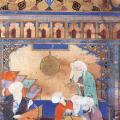175 - Bright Ideas: Illuminationism
The Illuminationists carry on Suhrawardī’s critique of “Peripatetic” philosophy and wonder if they will be reborn as giraffes.
Themes:
• Y.T. Langermann, “Ibn Kammūna and the ‘New Wisdom’ of the Thirteenth Century,” Arabic Sciences and Philosophy 15 (2005), 277-327.
• R. Marcotte, “Suhrawardī’s Realm of the Imaginal,” in Y. Eshots (ed.), Ishraq: Islamic Philosophy Yearbook (Moscow: 2011), 68-79.
• L. Muehlethaler, Ibn Kammūna (d.683/1284) on the Eternity of the Human Soul: The Three Treatises on the Soul and Related Texts (Yale PhD, 2010). [My thanks to the author for making a copy available to me.]
• L. Muehlethaler, “Revising Avicenna’s Ontology of the Soul: Ibn Kammūna on the Soul’s Eternity a Parte Ante,” The Muslim World 102 (2012), 597-616.
• R. Pourjavady and S. Schmidtke, A Jewish Philosopher of Baghdad: ʿIzz al-Dawla ibn Kammūna (d.683/1284) (Leiden: 2006).
• S. Schmidtke, “The Doctrine of the Transmigration of Soul According to Shihāb al-Dīn al-Suhrawardī (Killed 587/1991) and his Followers,” Studia Iranica 28 (1999), 237-54.
• L.W.C. van Lit, The World of Image in Islamic Philosophy: Ibn Sīnā, Suhrawardī, Shahrazūrī and Beyond (Edinburgh: 2018).
• J. Walbridge, The Science of Mystic Lights: Quṭb al-Dīn al-Shīrāzī and the Illuminationist Tradition in Islamic Philosophy (Cambridge MA: 1992).
• H. Ziai, “The Illuminationist Tradition”, in S.H. Nasr and O. Leaman (eds), History of Islamic Philosophy (London: 1996), 465-96.
My thanks to Lukas Muehlethaler for his advice on this episode!
And one correction: I incorrectly state in this episode that Quṭb al-Dīn al-Shīrāzī was a shiite thinker but this seems not to be true (it is true that his teacher al-Ṭūsī was though.)







Comments
A Question About Complete Causes
Dear Peter
Thanks for another great episode. I was particularly taken by the section on Ibn Kammūna and his ideas about complete causes. When he applies this to soul, he seems to go down a line that has wide reaching consequences, which - if I've got this right - goes something like this:
Complete causes guarantee their effect, so if God is the complete cause of a thing, that thing must be eternal, since God is eternal. Ibn Kammūna uses this argument to prove the eternal nature of the soul, but it seems the same argument would apply to anything 'caused' by God. However, if this is so, it would have a big knock on effect of some other key issues. I don't see how, for example, God could cause anything that wasn't eternal and it's surely a big problem if he didn't create temporary things such as the sun and the earth, or any of the creatures on it. Further, Avicenna's proof of the necessary existent (i.e. God) depends on contingent - and therefore temporary- things being caused by the necessary existent. Thus, you would be forced to conclude that the neccessary existent must be temporary in order to be the complete cause of contingent things, and therefore either God isn't the necessary existent, or God isn't eternal. This leads to a breakdown in the extended chain of argument: if God isn't eternal then time pre-exists God and therefore all things don't need the neccesary existent to cause them and therefore , a necessary existent is not necessary.
You can probably see why this line of thought is causing me problems
Regards, Dave M
Ishraq and Kalam
Hello Prof. Adamson,
Was there a relationship between the Ishraqi tradition and Kalam? I tried to read up on Fakhr al-Din Razi's Illuminationist Discourses to see if it was intended to be an Ishraqi work but none of the secondary literature I read answered my question. I know Mulla Sadra was hostile towards Kalam, but I would like to know about the general mood between both sides. Did the Mutakalimun aim polemics at the Ishraqis like they did the Peripatetics?
In reply to Ishraq and Kalam by Gizawi
Ishraqis and kalam
That's a good question. Basically I would say no: in the 12-13th centuries these are two separate traditions for the most part, albeit that figures like Ibn Kammuna and Qutb al-Din al-Shirazi do draw on both strands. But it is really only later that we have figures who a both full blown Illuminationists and full blown Avicennan mutakallimun, like the Shirazi thinkers perhaps, or the most obvious example who is Sadra.
Hi Peter. Many thanks for
Hi Peter. Many thanks for your fabulous podcasts!
I just wanted to mention that as you said "Qutb al-Din al-Shirazi" was not Shi'ite, it's his pupil, "Qutb al-Din al-Razi" who was a Shi'ite.
Qutb al-Din al-Razi was a student of Allama Hilli, the great Shi'ite theologian, and the teacher of Shams al-Din Muhammad 'Ameli, aka the first martyr. He was a commentator of Suhrawardi's works and he wrote a book called "Judgment Between Fakhr al-Razi and al-Tusi's Commentaries on Avicenna's Isharat" as well.
In reply to Hi Peter. Many thanks for by Nima
Qutb al-Din
Yes, thanks for pointing that out - I actually had caught the error anyway and fixed it for the book version, but decided it wasn't a big enough slip to re-record the episode (this isn't mere laziness, it is also hard to do a "patch" over something like that without making the audio sound weird).
Add new comment